31 aug 2016
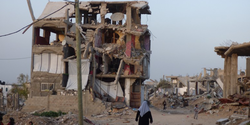
The humanitarian affairs office of the UN in Palestine warns of dwindling funds for its stopgap solutions to Israeli occupation and besiegement of Gaza.
The United Nations Office for the Coordination of Humanitarian Affairs in Occupied Palestinian Territory (OCHA) released a report to mark two years since the 26 August 2014 ceasefire that ended what it deems “the most devastating round of hostilities in Gaza since the beginning of the Israeli occupation in 1967.”
Specifically, the report provides a “snapshot” of progress made and outstanding needs in Gaza in the wake of Israel’s 2014 attack.
In 2014, over the course of 51 days, Israeli forces killed at least 2,220 Palestinians and injured another 11,231. Half a million people – or, 28% of Gaza’s population – were displaced consequently.
The report cites the Detailed Needs Assessment and Recovery Framework for Gaza (DNA), a joint effort of the Government of the State of Palestine, the UN, the World Bank and the European Union, to highlight the minimum amount of financial support that Gaza requires for reconstruction after the 2014 attack. According to the DNA, Gaza needs $3.9 billion for such efforts.
Restoring basic necessities
The United Nations Office for the Coordination of Humanitarian Affairs in Occupied Palestinian Territory (OCHA) released a report to mark two years since the 26 August 2014 ceasefire that ended what it deems “the most devastating round of hostilities in Gaza since the beginning of the Israeli occupation in 1967.”
Specifically, the report provides a “snapshot” of progress made and outstanding needs in Gaza in the wake of Israel’s 2014 attack.
In 2014, over the course of 51 days, Israeli forces killed at least 2,220 Palestinians and injured another 11,231. Half a million people – or, 28% of Gaza’s population – were displaced consequently.
The report cites the Detailed Needs Assessment and Recovery Framework for Gaza (DNA), a joint effort of the Government of the State of Palestine, the UN, the World Bank and the European Union, to highlight the minimum amount of financial support that Gaza requires for reconstruction after the 2014 attack. According to the DNA, Gaza needs $3.9 billion for such efforts.
Restoring basic necessities
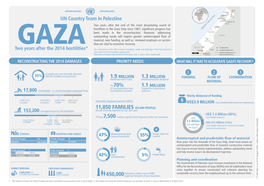
The report identifies the largest amount of money – $1.4 billion – as necessary to address persistent infrastructure damage, rubble removal, as well as losses of homes, energy and water facilities in Gaza. This sector has also been the site of the most successful reconstruction projects since 2014.
OCHA reports that 50% of repairs to houses that were damaged but still inhabitable during the war have been completed, and another 12% are in progress.
Over 30% of severely damaged, uninhabitable homes have been reconstructed, and another 30% are undergoing reconstruction.
All 78 hospitals and primary health care clinics that were damaged by Israeli attacks in 2014 have been repaired. Work continues on the three clinics that were totally destroyed in 2014.
Of the 252 schools that were damaged in 2014, all have been repaired, while reconstruction is ongoing at the seven schools that were completely destroyed.
Four out of 14 higher education institutions that were damaged in the 2014 aggression have been repaired, while work continues on another seven.
Out of 274 Kindergartens damaged during the hostilities, 180 have been repaired.
The UN has rehabilitated two cultural sites and provided support for the rehabilitation of three mosques, as Israeli forces damaged 22 cultural heritage sites and 33 cultural institutions in Gaza in 2014.
Moreover, a combination of UN and private sector efforts has removed 1.8 million tons of rubble from Gaza. In the process, the UN cleared over 3,300 explosive remnants of war from the rubble – an ongoing danger that affects 450,000 Palestinian children in Gaza.
Almost all water, wastewater and energy networks and facilities that were damaged in 2014 have been repaired or are well on their way to being repaired, the report claims.
Dwindling funds
Though donors pledged to supply Gaza with $3.5 billion of the $3.9 billion it requires for reconstruction efforts, DNA has been funded less than 20% since the 2014 attack: just $472 million has been disbursed to the fund.
According to DNA, a total of $763 million is needed to address the immediate needs of those who were made most vulnerable in 2014 alone – i.e. the internally displaced, food insecure, those with special needs, etc.
Failure to meet these pledged donations will primarily affect the 65,000 Gazans who continue to be displaced and/or require humanitarian assistance as of 2014.
Already, the report discloses, “lack of funding in 2016 has meant that over 7,500 families are without any support in the second half of [2016].”
In addition to affecting the availability of humanitarian resources like cash assistance and temporary shelter, the upcoming lack of funding will hinder home repairs: about 60,000 homes continue to await repairs when “little additional funding has been received since [2014].”
Of the severely damaged and uninhabitable homes that still need to be repaired, funding guarantees that another 14% will be completed, which leaves about 4,800 destroyed homes’ unaccounted for.
Under such desperate circumstances, little attention has been paid to issues beyond securing basic survival for vulnerable Gaza residents, such as the important task of preserving Gaza’s culture. “No funding has been received for the cultural reconstruction and recovery programs,” OCHA emphasizes.
Stopgap solutions to Israeli occupation
OCHA reports that 50% of repairs to houses that were damaged but still inhabitable during the war have been completed, and another 12% are in progress.
Over 30% of severely damaged, uninhabitable homes have been reconstructed, and another 30% are undergoing reconstruction.
All 78 hospitals and primary health care clinics that were damaged by Israeli attacks in 2014 have been repaired. Work continues on the three clinics that were totally destroyed in 2014.
Of the 252 schools that were damaged in 2014, all have been repaired, while reconstruction is ongoing at the seven schools that were completely destroyed.
Four out of 14 higher education institutions that were damaged in the 2014 aggression have been repaired, while work continues on another seven.
Out of 274 Kindergartens damaged during the hostilities, 180 have been repaired.
The UN has rehabilitated two cultural sites and provided support for the rehabilitation of three mosques, as Israeli forces damaged 22 cultural heritage sites and 33 cultural institutions in Gaza in 2014.
Moreover, a combination of UN and private sector efforts has removed 1.8 million tons of rubble from Gaza. In the process, the UN cleared over 3,300 explosive remnants of war from the rubble – an ongoing danger that affects 450,000 Palestinian children in Gaza.
Almost all water, wastewater and energy networks and facilities that were damaged in 2014 have been repaired or are well on their way to being repaired, the report claims.
Dwindling funds
Though donors pledged to supply Gaza with $3.5 billion of the $3.9 billion it requires for reconstruction efforts, DNA has been funded less than 20% since the 2014 attack: just $472 million has been disbursed to the fund.
According to DNA, a total of $763 million is needed to address the immediate needs of those who were made most vulnerable in 2014 alone – i.e. the internally displaced, food insecure, those with special needs, etc.
Failure to meet these pledged donations will primarily affect the 65,000 Gazans who continue to be displaced and/or require humanitarian assistance as of 2014.
Already, the report discloses, “lack of funding in 2016 has meant that over 7,500 families are without any support in the second half of [2016].”
In addition to affecting the availability of humanitarian resources like cash assistance and temporary shelter, the upcoming lack of funding will hinder home repairs: about 60,000 homes continue to await repairs when “little additional funding has been received since [2014].”
Of the severely damaged and uninhabitable homes that still need to be repaired, funding guarantees that another 14% will be completed, which leaves about 4,800 destroyed homes’ unaccounted for.
Under such desperate circumstances, little attention has been paid to issues beyond securing basic survival for vulnerable Gaza residents, such as the important task of preserving Gaza’s culture. “No funding has been received for the cultural reconstruction and recovery programs,” OCHA emphasizes.
Stopgap solutions to Israeli occupation
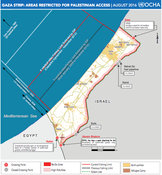
However, despite specifying an amount of funding required to “repair” Gaza, OCHA notes that as a consequence of multiple rounds of Israeli hostilities against the coastal enclave, “even reconstructing the Gaza Strip to pre-July 2014 standards will be far from sufficient to meet the significant humanitarian and developmental needs of the people in the Gaza Strip.”
Indeed, prior to 2014, Gaza was already suffering from 7 years under Israeli blockade and multiple rounds of Israeli attacks. Today, 1.3 million Gazans are in need of humanitarian assistance – just under 70% of Gaza’s population.
Moreover, even reconstruction efforts deemed successful can’t fully succeed under the Israeli blockade. For example, though all water and electricity systems have been declared “repaired,” just 45% of Gaza’s energy needs are being met, and 70% of Gazans have access to tap water for only 6 to 8 hours every 2 to 4 days due to Israeli restrictions on fuel imports.
Recognizing Gaza’s untenable situation under Israeli control, OCHA calls on Israel to “allow greater movement of Palestinians between the West Bank and Gaza” and, referencing Israel’s restriction regime on imports to Gaza, “make sure the categorization of ‘dual use’ items follow international standards.’”
But, until the occupation and besiegement of Gaza ends, along with the rest of Palestine, humanitarian crises will persist in Palestine while international bodies’ best stopgap solutions perpetually play catch-up.
Indeed, prior to 2014, Gaza was already suffering from 7 years under Israeli blockade and multiple rounds of Israeli attacks. Today, 1.3 million Gazans are in need of humanitarian assistance – just under 70% of Gaza’s population.
Moreover, even reconstruction efforts deemed successful can’t fully succeed under the Israeli blockade. For example, though all water and electricity systems have been declared “repaired,” just 45% of Gaza’s energy needs are being met, and 70% of Gazans have access to tap water for only 6 to 8 hours every 2 to 4 days due to Israeli restrictions on fuel imports.
Recognizing Gaza’s untenable situation under Israeli control, OCHA calls on Israel to “allow greater movement of Palestinians between the West Bank and Gaza” and, referencing Israel’s restriction regime on imports to Gaza, “make sure the categorization of ‘dual use’ items follow international standards.’”
But, until the occupation and besiegement of Gaza ends, along with the rest of Palestine, humanitarian crises will persist in Palestine while international bodies’ best stopgap solutions perpetually play catch-up.
30 aug 2016
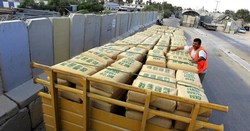
Usama Kahil, head of the Palestinian Contractors Union, warned of the continuation of cement quantity reduction.
In an exclusive statement to the PIC on Tuesday, Kahil slammed international and local institutions as well as popular bodies for turning a deaf ear to Israeli reduction of the allowed cement quantity into Gaza.
He revealed that the quantity of cement was limited to 80 out of 140 trucks.
This has badly affected contractor companies since quantities of cement take weeks to enter the Gaza Strip in order to complete a single project which causes a lot of financial losses, he said.
Kahil pointed out that the UN mechanism for Gaza reconstruction has been failing to meet anticipated results since Israeli occupation authorities did not abide by it under false pretexts.
Contractors have been calling for cancelling the UN mechanism, he underlined. Kahil appealed to Palestinian officials in order to contact Israeli occupation authorities to solve this crisis and pressure Israeli occupation by heading to international concerned institutions.
Escalated steps might be pursued by Gazan contractors in order to provide required cement quantities, he said.
In an exclusive statement to the PIC on Tuesday, Kahil slammed international and local institutions as well as popular bodies for turning a deaf ear to Israeli reduction of the allowed cement quantity into Gaza.
He revealed that the quantity of cement was limited to 80 out of 140 trucks.
This has badly affected contractor companies since quantities of cement take weeks to enter the Gaza Strip in order to complete a single project which causes a lot of financial losses, he said.
Kahil pointed out that the UN mechanism for Gaza reconstruction has been failing to meet anticipated results since Israeli occupation authorities did not abide by it under false pretexts.
Contractors have been calling for cancelling the UN mechanism, he underlined. Kahil appealed to Palestinian officials in order to contact Israeli occupation authorities to solve this crisis and pressure Israeli occupation by heading to international concerned institutions.
Escalated steps might be pursued by Gazan contractors in order to provide required cement quantities, he said.
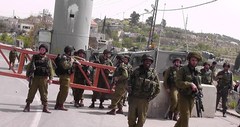
Israeli Occupation forces (IOF) confiscated on Monday a bulldozer owned by a Palestinian company during renovation works of a road near Kiryat Arba settlement which was established over Palestinians’ land in al-Khalil.
The coordinator of the popular and national committee against settlement and Separation Wall in the southern West Bank Rateb al-Jabour said that the bulldozer was transferred to the nearby Kharsina outpost.
He added that Israeli forces stopped renovation works of another road which connects two villages in al-Khalil. He underlined that the road is of great importance since it links the towns in southern al-Khalil.
Israeli forces claimed that halting renovation works in the roads were done for lacking construction permits in an Israeli-controlled area.
Earlier on Monday, Israeli forces stormed housing compounds in Mesafer Yatta town in al-Khalil and searched Palestinians’ homes for the second time in a week.
The coordinator of the popular and national committee against settlement and Separation Wall in the southern West Bank Rateb al-Jabour said that the bulldozer was transferred to the nearby Kharsina outpost.
He added that Israeli forces stopped renovation works of another road which connects two villages in al-Khalil. He underlined that the road is of great importance since it links the towns in southern al-Khalil.
Israeli forces claimed that halting renovation works in the roads were done for lacking construction permits in an Israeli-controlled area.
Earlier on Monday, Israeli forces stormed housing compounds in Mesafer Yatta town in al-Khalil and searched Palestinians’ homes for the second time in a week.
18 aug 2016
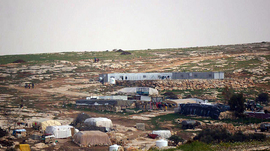
The tent village of Susya with illegal EU built structures
Approximately 300 Palestinian Bedouin have begun to build a village with European Union assistance without building permits; although the High Court of Justice issued a demolition order, nothing has changed on the ground; The Palestinians and the Israeli government are in negotiations over how to handle the issue.
The High Court of Justice ordered illegal structures in Susya to be demolished two years ago. The Court then requested the state's position on the issue. However, due to international pressure, the state has yet to take a stance.
The village of Susya is a Bedouin village built without permits in the Israeli controlled Area C of the West Bank. The international community has been putting pressure on the Israeli leadership to not destroy the illegal structures for years, saying that it would make 300 people homeless, and endanger the two state solution. The European Union has built structures on the land for the Palestinians without obtaining building permits from the Israeli government.
In an effort to come to an understanding between the Israeli government and the Palestinian Authority, Israel has said that it wants to move the villagers to a nearby hill and give them 540 dunams next to the Palestinian town of Yatta, from which many of them hail. Meanwhile, the Palestinians have requested to make arrangements to enable the village to continue to exist where it is while giving the villagers 1,500 dunams of land for agricultural purposes.
After the "Regavim" movement brought the issue to the High Court of Justice's attention, the High Court issued an order forbidding the Palestinians from building additional structures in the village. A demolition order was signed in 2014 to demolish structures built despite the order not to build. The High Court also denied a Palestinian request to prohibit the relevant authorities from carrying out the demolitions. The High Court said that the Palestinians are making laws unto themselves, and are continuing to build in defiance of a court order.
Throughout this time, There have been dozens of attempts by the Israeli government and the Palestinians to try to come to a compromise, but they have all failed due to seemingly insurmountable differences between the two sides. The Palestinians insist that they are not willing to give up the land and claim they will not move under the framework of any solution.
Regavim replied in response, "this is a clan of a few dozen people making a crazy demand for land that is comparable to the size of Beit Dagan or Rosh Pina. The Nawajah family owns homes in Yatta and therefore it's the government's job to evict them to ensure they go back to their homes. Even the solution offered by the government to facilitate their relocation to areas close to Yatta is too lenient."
"We expect the Prime Minister to ignore foreign pressure, which constitutes blatant interference in the internal affairs of Israel, and make a decision which reflects the rule of law and the national interests of Israel," Regavim continued.
Approximately 300 Palestinian Bedouin have begun to build a village with European Union assistance without building permits; although the High Court of Justice issued a demolition order, nothing has changed on the ground; The Palestinians and the Israeli government are in negotiations over how to handle the issue.
The High Court of Justice ordered illegal structures in Susya to be demolished two years ago. The Court then requested the state's position on the issue. However, due to international pressure, the state has yet to take a stance.
The village of Susya is a Bedouin village built without permits in the Israeli controlled Area C of the West Bank. The international community has been putting pressure on the Israeli leadership to not destroy the illegal structures for years, saying that it would make 300 people homeless, and endanger the two state solution. The European Union has built structures on the land for the Palestinians without obtaining building permits from the Israeli government.
In an effort to come to an understanding between the Israeli government and the Palestinian Authority, Israel has said that it wants to move the villagers to a nearby hill and give them 540 dunams next to the Palestinian town of Yatta, from which many of them hail. Meanwhile, the Palestinians have requested to make arrangements to enable the village to continue to exist where it is while giving the villagers 1,500 dunams of land for agricultural purposes.
After the "Regavim" movement brought the issue to the High Court of Justice's attention, the High Court issued an order forbidding the Palestinians from building additional structures in the village. A demolition order was signed in 2014 to demolish structures built despite the order not to build. The High Court also denied a Palestinian request to prohibit the relevant authorities from carrying out the demolitions. The High Court said that the Palestinians are making laws unto themselves, and are continuing to build in defiance of a court order.
Throughout this time, There have been dozens of attempts by the Israeli government and the Palestinians to try to come to a compromise, but they have all failed due to seemingly insurmountable differences between the two sides. The Palestinians insist that they are not willing to give up the land and claim they will not move under the framework of any solution.
Regavim replied in response, "this is a clan of a few dozen people making a crazy demand for land that is comparable to the size of Beit Dagan or Rosh Pina. The Nawajah family owns homes in Yatta and therefore it's the government's job to evict them to ensure they go back to their homes. Even the solution offered by the government to facilitate their relocation to areas close to Yatta is too lenient."
"We expect the Prime Minister to ignore foreign pressure, which constitutes blatant interference in the internal affairs of Israel, and make a decision which reflects the rule of law and the national interests of Israel," Regavim continued.
15 aug 2016
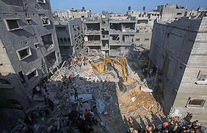
Two years since Operation Protective Edge, some 70,000 Palestinians have not been returned to their homes, and only 200 homes have been completely rebuilt.
Two years after the fighting between Israel and the Islamist Hamas movement in the Gaza Strip, about 70,000 Palestinians have not returned to their homes that were damaged in the fighting. Just 200 homes have been completely rebuilt and the families returned.
"We ask the international community to increase their donations and the countries who pledged billions to respect their pledge," Adnan Abu Husna, spokesman for the United Nations Relief and Works Agency (UNRWA) told The Media Line. "The people of Gaza should not get to the point that they feel they are forgotten."
Abu Hasna said that nearly 140,000 homes were damaged either totally or partially, mostly from Israeli airstrikes. Of those, 9500 were completely demolished, and 5000 were so damaged that people cannot live there. At an international donors conference soon after the fighting ended, UN officials asked for $724 million, but only received $257 million.
He said the UN has helped nearly 70,000 families with some type of financial assistance. While thousands of families were originally housed in UN schools, all of those whose homes were destroyed have either rented new homes, paid for by the UN, or are living with relatives.
The pace of reconstruction has been glacial, partly because Israel accuses Hamas, which controls Gaza, of diverting cement and other materials to build weapons and tunnels. Those allegations were strengthened last week, when the Israeli Shin Bet announced charges in two separate cases, against local employees in Gaza allegedly working for Hamas.
In the first case, Israel accused Mohammed al-Halabi, the head of World Vision in Gaza, of diverting more than seven million dollars each year since 2010 to Hamas in Gaza. "We condemn any diversion of funds from any humanitarian organization," World Vision International President Kevin Jenkins said in a statement. "If any of these allegations are proven to be true, we will take swift and decisive action," although added that the organization had "not seen any of the evidence," and suggested the numbers had been exaggerated.
"World Vision's cumulative operating budget in Gaza for the past ten years was approximately $22.5 million, which makes the alleged amount of up to $50 million being diverted hard to reconcile," the statement read. The organization suspended its operations in Gaza.
In the second case involving the UN Development Program, Israel charged Wahid Borsch, funneled resources to Hamas to build a naval port for Hamas commandos. UNDP denied any wrongdoing, saying that "the rubble in question was transported to its destination according to written instructions from the Ministry of Public Works and Housing of the Palestinian Authority as to where it should be placed."
UNDP officials also questioned the details of the case, saying they had not yet seen the evidence against Borsch. "We are waiting for the proof on all of these things," Dania Darwish, a spokeswoman for UNDP said. "Wahid is a contractor at UNDP. He does not have any management responsibilities. UNDP has strict processes and guidelines that must be followed."
In any case, even if all of the damaged homes are rebuilt, the economy in Gaza faces growing challenges. A World Bank report found that Gaza's unemployment is the highest in the world, and many of Gaza's residents are completely dependent on UN food aid.
Although Israel withdrew from Gaza in 2005, it continues to control what goes into and out of Gaza. Palestinians call it a blockade, while Israel says it has worked to prevent a humanitarian crisis.
"Everyone talks about what is going in to Gaza, but we also have to think about what is going out," UNRWA spokesman Chris Gunness said. "Unless Gaza can export, there won't be a viable economy there. There have been no meaningful exports from Gaza since 2007."
A spokesman for Israel's Coordinator of Government Activities in the Territories said they were unable to provide details of Palestinians exports allowed to leave Gaza.
Two years after the fighting between Israel and the Islamist Hamas movement in the Gaza Strip, about 70,000 Palestinians have not returned to their homes that were damaged in the fighting. Just 200 homes have been completely rebuilt and the families returned.
"We ask the international community to increase their donations and the countries who pledged billions to respect their pledge," Adnan Abu Husna, spokesman for the United Nations Relief and Works Agency (UNRWA) told The Media Line. "The people of Gaza should not get to the point that they feel they are forgotten."
Abu Hasna said that nearly 140,000 homes were damaged either totally or partially, mostly from Israeli airstrikes. Of those, 9500 were completely demolished, and 5000 were so damaged that people cannot live there. At an international donors conference soon after the fighting ended, UN officials asked for $724 million, but only received $257 million.
He said the UN has helped nearly 70,000 families with some type of financial assistance. While thousands of families were originally housed in UN schools, all of those whose homes were destroyed have either rented new homes, paid for by the UN, or are living with relatives.
The pace of reconstruction has been glacial, partly because Israel accuses Hamas, which controls Gaza, of diverting cement and other materials to build weapons and tunnels. Those allegations were strengthened last week, when the Israeli Shin Bet announced charges in two separate cases, against local employees in Gaza allegedly working for Hamas.
In the first case, Israel accused Mohammed al-Halabi, the head of World Vision in Gaza, of diverting more than seven million dollars each year since 2010 to Hamas in Gaza. "We condemn any diversion of funds from any humanitarian organization," World Vision International President Kevin Jenkins said in a statement. "If any of these allegations are proven to be true, we will take swift and decisive action," although added that the organization had "not seen any of the evidence," and suggested the numbers had been exaggerated.
"World Vision's cumulative operating budget in Gaza for the past ten years was approximately $22.5 million, which makes the alleged amount of up to $50 million being diverted hard to reconcile," the statement read. The organization suspended its operations in Gaza.
In the second case involving the UN Development Program, Israel charged Wahid Borsch, funneled resources to Hamas to build a naval port for Hamas commandos. UNDP denied any wrongdoing, saying that "the rubble in question was transported to its destination according to written instructions from the Ministry of Public Works and Housing of the Palestinian Authority as to where it should be placed."
UNDP officials also questioned the details of the case, saying they had not yet seen the evidence against Borsch. "We are waiting for the proof on all of these things," Dania Darwish, a spokeswoman for UNDP said. "Wahid is a contractor at UNDP. He does not have any management responsibilities. UNDP has strict processes and guidelines that must be followed."
In any case, even if all of the damaged homes are rebuilt, the economy in Gaza faces growing challenges. A World Bank report found that Gaza's unemployment is the highest in the world, and many of Gaza's residents are completely dependent on UN food aid.
Although Israel withdrew from Gaza in 2005, it continues to control what goes into and out of Gaza. Palestinians call it a blockade, while Israel says it has worked to prevent a humanitarian crisis.
"Everyone talks about what is going in to Gaza, but we also have to think about what is going out," UNRWA spokesman Chris Gunness said. "Unless Gaza can export, there won't be a viable economy there. There have been no meaningful exports from Gaza since 2007."
A spokesman for Israel's Coordinator of Government Activities in the Territories said they were unable to provide details of Palestinians exports allowed to leave Gaza.
2 aug 2016

The Qatari government will pay the July salaries of civil servants in the blockaded Gaza Strip, a Qatari diplomat said Tuesday.
"The Qatari grant for the Gaza civil servants’ salaries, valued at $31 million, will be paid out one time only," Ambassador Mohamed al-Emadi, head of Qatar’s National Committee for the Reconstruction of Gaza, said at a press conference.
The payment, he noted, would be disbursed via the UN and would not apply to salaries owed to Gaza’s security forces.
Instructions to pay last month’s salaries for Gaza’s civil servants were issued directly by the emir of Qatar, Sheikh Tamim bin Hamad Al Thani.
At Tuesday’s press conference, al-Emadi said he had received a list including the names of more than 23,800 civil servants in Gaza who met the requirements of the grant.
Last week, the Qatari ambassador arrived in Gaza City, where he is expected to sign a number of reconstruction projects worth a total of $40 million.
"The Qatari grant for the Gaza civil servants’ salaries, valued at $31 million, will be paid out one time only," Ambassador Mohamed al-Emadi, head of Qatar’s National Committee for the Reconstruction of Gaza, said at a press conference.
The payment, he noted, would be disbursed via the UN and would not apply to salaries owed to Gaza’s security forces.
Instructions to pay last month’s salaries for Gaza’s civil servants were issued directly by the emir of Qatar, Sheikh Tamim bin Hamad Al Thani.
At Tuesday’s press conference, al-Emadi said he had received a list including the names of more than 23,800 civil servants in Gaza who met the requirements of the grant.
Last week, the Qatari ambassador arrived in Gaza City, where he is expected to sign a number of reconstruction projects worth a total of $40 million.
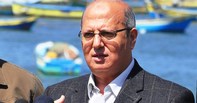
MP Jamal al-Khudari, head of the public committee against the siege, said that the Israeli refusal of establishing Gaza seaport tightens the siege.
In a press statement on Monday, MP Khudari pointed out that Gaza seaport is a right for the Palestinian people stipulated for in the international agreements.
It is one of the determinants of ending the siege totally besides opening of crossings, free commercial exchange, opening the safe pathway that connects Gaza to the West Bank and reconstructing and re-operating Arafat International Airport, he said.
Khudari called for concerted Palestinian effort and putting pressure at the local, regional and international levels for establishing the seaport as a complementary not alternative to commercial crossings and called for accomplishing all of those determinants.
In a press statement on Monday, MP Khudari pointed out that Gaza seaport is a right for the Palestinian people stipulated for in the international agreements.
It is one of the determinants of ending the siege totally besides opening of crossings, free commercial exchange, opening the safe pathway that connects Gaza to the West Bank and reconstructing and re-operating Arafat International Airport, he said.
Khudari called for concerted Palestinian effort and putting pressure at the local, regional and international levels for establishing the seaport as a complementary not alternative to commercial crossings and called for accomplishing all of those determinants.
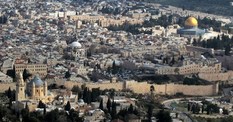
Until 2020 Jerusalem will be in need of 30,000 housing units, the Palestinian Housing Council said Monday.
The council’s technical director in the occupied West Bank, Zuheir Ali, said, at a workshop held in al-Bireh under the title “Housing in Occupied Jerusalem: Facts and Challenges,” that the Palestinians have been facing difficulties in constructing new homes on at least 13% of east Jerusalem lands.
Ali added that Israeli restrictive measures resulted in a sharp housing crisis and that Occupied Jerusalem is in need of 30,000 housing units, to the tune of around three billion dollars, until 2020.
Chairman of the council’s Management Board, Hesham al-Omari, said the council has done every possible effort to provide homeless Palestinians with 8,000 housing units with a total value of up to 205 million dollars.
Representative of the Organization of Islamic Cooperation in the occupied Palestinian territories, Ahmad al-Ruweidi, sounded the alarm over the tragic situation endured by Palestinians in Occupied Jerusalem in light of the crippling procedures perpetrated by the Israeli occupation as regards construction licenses.
The council’s technical director in the occupied West Bank, Zuheir Ali, said, at a workshop held in al-Bireh under the title “Housing in Occupied Jerusalem: Facts and Challenges,” that the Palestinians have been facing difficulties in constructing new homes on at least 13% of east Jerusalem lands.
Ali added that Israeli restrictive measures resulted in a sharp housing crisis and that Occupied Jerusalem is in need of 30,000 housing units, to the tune of around three billion dollars, until 2020.
Chairman of the council’s Management Board, Hesham al-Omari, said the council has done every possible effort to provide homeless Palestinians with 8,000 housing units with a total value of up to 205 million dollars.
Representative of the Organization of Islamic Cooperation in the occupied Palestinian territories, Ahmad al-Ruweidi, sounded the alarm over the tragic situation endured by Palestinians in Occupied Jerusalem in light of the crippling procedures perpetrated by the Israeli occupation as regards construction licenses.
